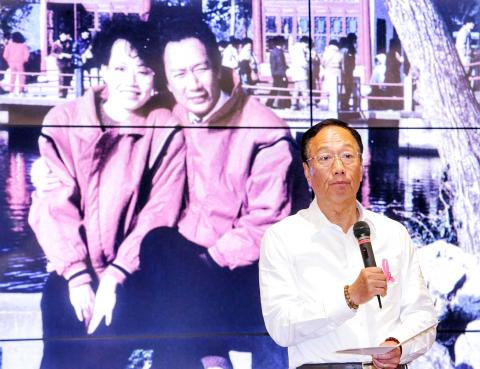Hon Hai Precision Industry Co (鴻海精密) chairman Terry Gou (郭台銘) yesterday said a healthcare foundation he created would work with leading research institutes in Taiwan and other nations to combat breast cancer.
The tycoon made the announcement at a news conference held by the Yonglin Healthcare Foundation in Taipei, saying that he has always been determined to “fight breast cancer with technology.”
In pledging to bring together the world’s medical and academic sectors on a single platform to confront the world’s most resilient disease, Gou said the foundation will form an anti-cancer alliance with the National Taiwan University Cancer Center, China’s BGI (華大基因), US-based Nantworks LLC and HudsAlpha Institute for Biotechnology, as well as Taiwan’s biotech sector.

Photo: CNA
The alliance is to work to determine the genomic code of breast cancer through life science, biotechnology, gene screening and analysis, Gou said.
Gou, whose first wife died of breast cancer in 2005, said “people should turn regret into strength.”
“We believe [we] can bring happiness to humanity,” he said, noting that business opportunities are less important than the chance to live.
“Life is priceless,” he added.
Addressing the alliance, Gou said breast cancer would be its first target, followed by leukemia.
Hon Hai’s cooperation with BGI — known prior to 2008 as the Beijing Genomics Institute — would be like an “industry party” joining hands with a “healthcare party” in the fight against cancer, he said.
BGI, headquartered in Shenzhen, Guangdong Province, is a genome sequencing center. It has been tasked with establishing a Chinese national gene databank and is working to apply its research in genomics to medicine and the germination of agricultural seeds.
At the press conference, BGI president Wang Jian (汪建) said he hopes that in the future, cancer would become a chronic disease that can be controlled.
“Our first objective is to make breast cancer a treatable and controllable disease like liver cancer in the shortest period of time,” Wang said.
Nantworks is a US pharmaceutical company that intends to innovate healthcare by using digital technologies. Also based in the US, HudsonAlpha is a nonprofit institute dedicated to innovation in the field of genomic technology.
Meanwhile, Gou said that he hopes one day the two sides of the Taiwan Strait will jointly establish a special zone for medical care and treatment on Kinmen.
Kinmen “should have a new start as the frontline in the battle against aging, illness and death,” Gou said. “If this is to be achieved in Kinmen, it will begin with health and the promotion of cross-strait peace.”

BUSINESS UPDATE: The iPhone assembler said operations outlook is expected to show quarter-on-quarter and year-on-year growth for the second quarter Hon Hai Precision Industry Co (鴻海精密) yesterday reported strong growth in sales last month, potentially raising expectations for iPhone sales while artificial intelligence (AI)-related business booms. The company, which assembles the majority of Apple Inc’s smartphones, reported a 19.03 percent rise in monthly sales to NT$510.9 billion (US$15.78 billion), from NT$429.22 billion in the same period last year. On a monthly basis, sales rose 14.16 percent, it said. The company in a statement said that last month’s revenue was a record-breaking April performance. Hon Hai, known also as Foxconn Technology Group (富士康科技集團), assembles most iPhones, but the company is diversifying its business to

Apple Inc has been developing a homegrown chip to run artificial intelligence (AI) tools in data centers, although it is unclear if the semiconductor would ever be deployed, the Wall Street Journal reported on Monday. The effort would build on Apple’s previous efforts to make in-house chips, which run in its iPhones, Macs and other devices, according to the Journal, which cited unidentified people familiar with the matter. The server project is code-named ACDC (Apple Chips in Data Center) within the company, aiming to utilize Apple’s expertise in chip design for the company’s server infrastructure, the newspaper said. While this initiative has been

GlobalWafers Co (環球晶圓), the world’s No. 3 silicon wafer supplier, yesterday said that revenue would rise moderately in the second half of this year, driven primarily by robust demand for advanced wafers used in high-bandwidth memory (HBM) chips, a key component of artificial intelligence (AI) technology. “The first quarter is the lowest point of this cycle. The second half will be better than the first for the whole semiconductor industry and for GlobalWafers,” chairwoman Doris Hsu (徐秀蘭) said during an online investors’ conference. “HBM would definitely be the key growth driver in the second half,” Hsu said. “That is our big hope

The consumer price index (CPI) last month eased to 1.95 percent, below the central bank’s 2 percent target, as food and entertainment cost increases decelerated, helped by stable egg prices, the Directorate-General of Budget, Accounting and Statistics (DGBAS) said yesterday. The slowdown bucked predictions by policymakers and academics that inflationary pressures would build up following double-digit electricity rate hikes on April 1. “The latest CPI data came after the cost of eating out and rent grew moderately amid mixed international raw material prices,” DGBAS official Tsao Chih-hung (曹志弘) told a news conference in Taipei. The central bank in March raised interest rates by